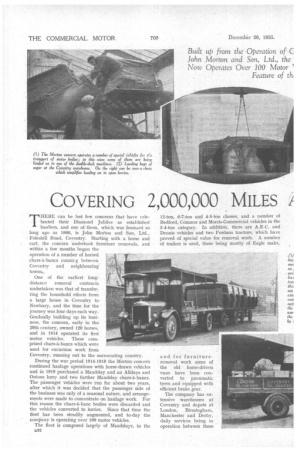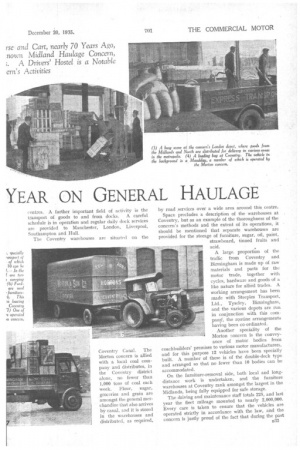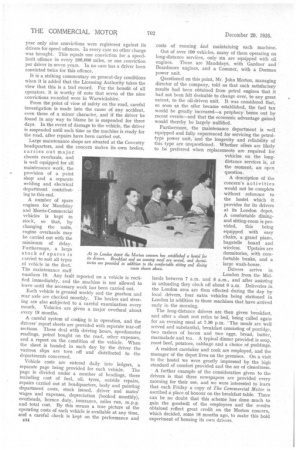COVERING 2,000,000 MILES
Page 42

Page 43

Page 44

If you've noticed an error in this article please click here to report it so we can fix it.
YEAR ON GENERAL HAULAGE
THERE can be but few concerns that have celebrated their Diamond Jubilee as established hauliers, and one of them, which was founued so long ago as 1866, is John Morton and Son, Ltd., Foleshill Road, Coventry. Starting with a horse and cart, the concern undertook furniture removals, and within a few months began the operation of a number of horsed chars-k-bancs xunnir g between Coventry and neighbouring towns,
One of the earliest longdistance removal contracts undertaken was that of transferring the household effects from a large house in Coventry to Newbury, and the time for the journey was four days each way. Gradually building up its business, the concern, early in the 20th century, owned 120 horses, and in 1914 operated its first motor vehicles. These comprised chars-k-bancs which were used for excursion work from Coventry, running out to the surrounding country.
During the war period 1914-1918 the Morton concern continued haulage operations with horse-drawn vehicles and in 1919 purchased a Maudslay and an Alldays and Onions lorry and two further Maudslay chars-&-bancs. The passenger vehicles were run for about two years, after which it was decided that the passenger side of the business was only of a seasonal nature, and arrangements were made to concentrate on haulage work. For this reason the chars-k-banc bodies were discarded and the vehicles converted to lorries. Since that time the fleet has been steadily augmented, and to-day the company is operating over 100 motor vehicles.
The fleet is composed largely of Maudslays, in the ti32 12-ton, 6-7-ton and 4-5-ton classes, and a number of Bedford, Commer and Morris-Commercial vehicles in the 3-4-ton category. In addition, there are A.E.C. and Dennis vehicles and two Fordson tractors, which have proved of special value for removal work. A number of trailers is used, these being mostly of Eagle make, and for furniture. removal work some of the old horse-driven vans have been converted to pneumatic tyres and equipped with efficient brake gear.
The company has extensive warehouses at Coventry and depots at London, Birmingham, Manchester and Derby, daily services being in operation between these centres. A further important field of activity is the transport of goods to and from docks. A careful schedule is in operation and regular daily dock services are provided to Manchester, London, Liverpool, Southampton and Hull.
The Coventry warehouses are situated on the
Coventry Canal. The Morton concern is allied with a local coal company and distributes, in the Coventry district alone, no fewer than 1,000 tons of coal each week. Flour, sugar, groceries and grain are amongst the general inerchandize that also arrives by canal, and it is stored in the warehouses and distributed, as required,
by road services over a wide area around this centre.
Space precludes a description of the warehouses at Coventry, but as an example of the thoroughness of the concern's methods and the extent of its operations, it should be mentioned that separate warehouses are provided for the storage of furniture, sugar, oil, paint, strawboard, tinned fruits and acid.
A large. proportion of the traffic from Coventry and Birmingham is made up of raw materials and parts for the motor trade, together with cycles, hardware and goods of a like nature for allied trades. A working arrangement has been made with Steeples Transport, Ltd., Tyseley, Birmingham, and the. various depots are run in conjunction with this company-, the routine arrangements having been co-ordinated.
Another speciality of the Morton concern is the conveyance of motor bodies from coachbuilders' premises to various motor manufacturers, and for this purpose 12 vehicles have been specially built. A number of these is of the double-deck type and arranged so that no fewer than 10 bodies can be accommodated.
On the furniture-removal side, both local and longdistance work is undertaken, and the furniture warehouses at Coventry rank amongst the largest in the Midlands, being fully equipped for safe storage.
The driving and maintenance staff totals 225, and last year the fleet mileage mounted to nearly 2,000,000. Every care is taken to ensure that the vehicles are operated strictly in accordance with the law, and the concern is Justly proud of the fact that during the past year only nine convictions were registered against its drivers for speed offences. In every case no other charge was brought. This equals one conviction for a speedlimit offence in every 200,000 miles, or one conviction per driver in seven years. In no case has a driver been convicted twice for this offence.
It is a striking commentary on present-day conditions when it is added that the Licensing Authority takes the view that this is a bad record. For the benefit of all operators. it is worthy of note that seven of the nine convictions recorded were in Warwickshire.
From the point of view of safety on the road, careful investigation is made into the cause of any accident, even those of a minor character, and if the driver be found in any way to blame he is suspended for three days. In the event of damage to the vehicle, the driver is suspended until such time as the machine is ready for the road, after repairs have been carried out.
Large maintenance shops are situated at the Coventry headquarters, and the concern makes its .own bodies, carries out major chassis overhauls, and is well equipped for all maintenance work, the provision of a paint shop' and a separate welding and electrical department contributing to this end.
A number of spare engines for Maudslay and Morris-Commercial vehicles is kept in stock, so that, by changing the units, engine overhauls may be carried out with the minimum of delay.
Furthermore, a large stock of spares is carried to suit all types of vehicle in the fleet. The maintenance staff numbers 10. Any fault reported on a vehicle is rectified immediately, and the machine is not allowed to leave until the necessary work has been carried out.
Each vehicle is greased weekly and the gearbox and rear axle are checked monthly. The brakes and steering are also subjected to a careful examination every month. Vehicles are given a major overhaul about every 18 months.
A careful system of costing is in operation, and the drivers' report sheets are provided with separate tear-off sections. These deal with driving hours, speedometer readings, petrol bought on the road, other expenses, and a report on the condition of the vehicle. When the sheet is handed in each day by the driver the various slips are torn . off and distributed to the departments concerned.
Vehicle costs are entered daily into ledgers, a separate page being provided for each vehicle. The page is divided under a number of headings, these including cost of fuel, oil, tyres, outside repairs, repairs carried out at headquarters, body and painting department costs, stock issued, driver and mates' wages and expenses, depreciation (booked monthly), overheads, licence duty, insurance, miles run, m.p.g. and total cost. By this means a true picture of the operating costs of each vehicle is available at any time, and a careful check is kept on the performance and costs of running and maintainink each machine.
Out of over 100 vehicles, many of them operating on long-distance services, only. six are equipped with oil engines. These are Maudslays, with Gardner and Beardmore engines, and a Commer, with a Dorman power unit.
Questioned on this point, Mr. John Morton, managing director of the company, told us that such satisfactory results had been obtained from petrol engines that it had not been felt desirable to change over, to any great extent, to the oil-driven unit. It was considered that. so soon as the oiler became established, the fuel tax would he greatly increased—a prophecy borne out by recent events—and that the economic advantage gained would thereby be largely nullified.
Furthermore, the maintenance department is well equipped and fully experienced for servicing the petroltype power unit, and the longevity and reliability of this type are unquestioned. Whether oilers are likely to be preferred when replacements are required for vehicles on the longdistance services is, at the moment, an open question.
A description of the concern's activities would not be complete without reference to the hostel which it provides for its drivers at its London depot. A comfortable diningand sitting-room is provided, this being equipped with easy chairs, a grand piano, bagatelle board and wireless. Upstairs are dormitories, with comfortable bunks, and a large wash-house.
Drivers arrive in London from the Midlands between 7 a.m. and 8 a.m., and after assisting in unloading they clock off about 9 a.m. Deliveries in the London area are then effected during the day by local drivers, four extra vehicles being stationed in London in addition to those machines that have arrived early in the morning.
The long-distance drivers are then given breakfast, and after a short rest retire to bed, being called again for an evening meal at 7.30 p.m. "The meals are well served and substantial, breakfast consisting of porridge, two rashers of bacon and two eggs, bread, butter, marmalade and tea. A typical dinner provided is soup, roast beef, potatoes, cabbage and a choice of puddings.
A resident caretaker and cook are employed, and the manager of the depot lives on the premises. On a Visit to the hostel we were greatly impressed by the high standard of comfort provided and the air of cleanliness. ' A further example of the consideration given to the drivers is that three newspapers are provided every morning for their use, and we were interested to learn that each Friday a copy of The Commercial Motor is ascribed a place of honour on the breakfast table. There can be no doubt that this scheme has done much to gain the goodwill of the employees and the results obtained reflect great credit on the Morton concern, which decided, some 18 months ago, to make this bold experiment of housing its own drivers.




















































































